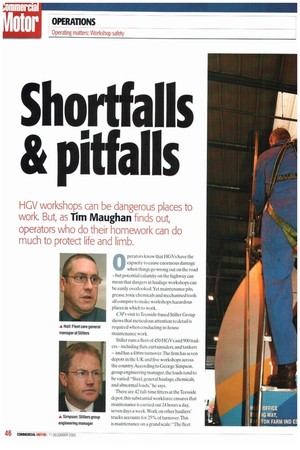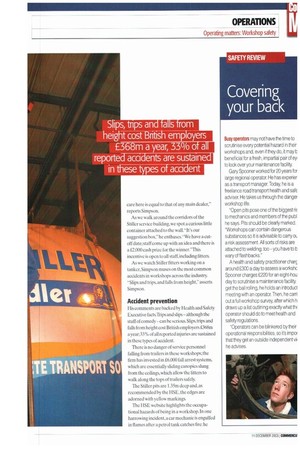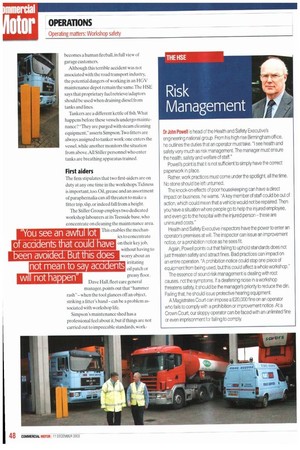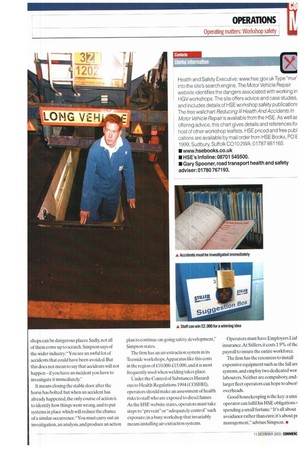Shortfalls
Page 48

Page 49

Page 50

Page 51

If you've noticed an error in this article please click here to report it so we can fix it.
at pitfalls
HGV workshops can be dangerous places to work. But, as Tim Maughan finds out, operators who do their homework can do much to protect life and limb.
0 perators know that HGVs have the capacity to cause enormous damage when things go wrong out on the road — but potential calamity on the highway can mean that dangers in haulage workshops can be easily overlooked. Yet maintenance pits. grease, toxic chemicals and mechanised tools all conspire to make workshops hazardous places in which to work.
CM's visit to Teesside-based Stiller Group shows that meticulous attention to detail is A Hall: Fleet care general required when conducting in-house maintenance work.
Stiller runs a fleet of 450 HGVs and 900 trailers— including flats, curtainsiders, and tankers — and has a £66m tumover.The firm has seven depots in the UK and five workshops across the country. According to George Simpson, group engineering manager, the loads tend to be varied: "Steel, general haulage, chemicals, and abnormal loads," he says.
There are 42 full-time fitters at the Teesside depot:this substantial workforce ensures that maintenance is carried out 24 hours a day, seven days a week. Work on other hauliers' A Simpson: Sullen group trucks accounts for 25% of turnover.This engineering manager is maintenance on a grand scale:"Thc fleet care here is equal to that of any main dealer," reports Simpson.
As we walk around the corridors of the Stiller service building, we spot a curious little container attached to the wall."It's our suggestion box,he enthuses.-We have a cutoff date; staff come up with an idea and there is a £2,000 cash prize for the winner."This incentive is open to all staff, including fitters.
As we watch Stiller fitters working on a tanker. Simpson muses on the most common accidents in workshops across the industry. "Slips and trips, and falls from height," asserts Simpson.
Accident prevention
His comments are backed by Health and Safety Executive facts.Tiips and slips although the stuff of comedy-can be serious Slips.trips and falls from height cost British employers £368m a year; 33 % of all reported injuries are sustained in these types of accident.
There is no danger of service personnel falling from trailers in these workshops; the firm has invested in £6.000 fall arrest systems, which are essentially sliding canopies slung from the ceilings, which allow the fitters to walk along the tops of trailers safely.
The Stiller pits are 1.35m deep and, as recommended by the HSE, the edges are adorned with yellow markings The HSE website highlights the occupational hazards of being in a workshop. In one harrowing incident, a car mechanic is engulfed in flames after a petrol tank catches fire: he becomes a human fireball, in full view of garage customers.
Although this terrible accident was not associated with the road transport industry, the potential dangers of working in an HGV maintenance depot remain the same.The HSE says that proprietary fuel retrieve/adaptors should be used when draining diesel from tanks and lines.
Tankers are a different kettle of fish.What happens before these vessels undergo maintenance? -They are purged with steam cleaning equipment," asserts Simpson.Two litters are always assigned to tanker work: one enters the vessel, while another monitors the situation from above. All Stiller personnel who enter tanks are breathing apparatus trained.
First alders
The firm stipulates that two first-alders are on duty at any one time in the workshops.Tidiness is important, too. Oil, grease and an assortment of paraphernalia can all threaten to make a fitter trip.slip.or indeed fall from a height.
The Stiller Group employs two dedicated workshop labourers at its Teesside base, who concentrate on cleaning the maintenance area. This enables the mechan ics to concentrate on their key job. without having to worry about an irritating oil patch or greasy floor.
Dave Hall.fleet care general manager,points out that "hammer rash-when the tool glances off an object, striking a fitter's hand -can be a problem associated with workshop life.
Simpson's maintenance shed has a professional feel about it, hut if things are not carried out to impeccable standards. work shops can be dangerous places. Sadly, not all of them come up to scratch. Simpson says of the wider industry: 'You see an awful lot of accidents that could have been avoided. But this does not mean to say that accidents will not happen — if you have an incident you have to investigate it immediately."
It means closing the stable door after the horse has bolted: but when an accident has already happened, the only course of action is to identify how things went wrong, and to put systems in place which will reduce the chance of a similar occurrence. "You must carry out an investigation, an analysis, and produce an action plan to continue on-going safety development," Simpson states The firm has an air-extraction system in its Teesside workshops.Apparatus like this costs in the region of /10,000415,000, and it is most frequently used when welding takes place.
Under the Control of Substances Hazardous to Health Regulations 1994 (COSHH), operators should make an assessment of health risks to staff who are exposed to diesel fumes. As the HSE website states, operators must take steps to "prevent" or "adequately control" such exposure; in a busy workshop that invariably means installing air-extraction systems. Operators must have Employers Liat insurance. At Stillers, it costs 1.9% of the payroll to insure the entire workforce.
The firm has the resources to install expensive equipment such as the fall art systems, and employ two dedicated wor labourers. Neither are compulsory, and larger fleet operators can hope to absorl overheads Good housekeeping is the key: a smal operator can fulfil his HSE obligations spending a small fortune."It's all about avoidance rather than cure; it's about pt management," advises Simpson.


























































































































































































